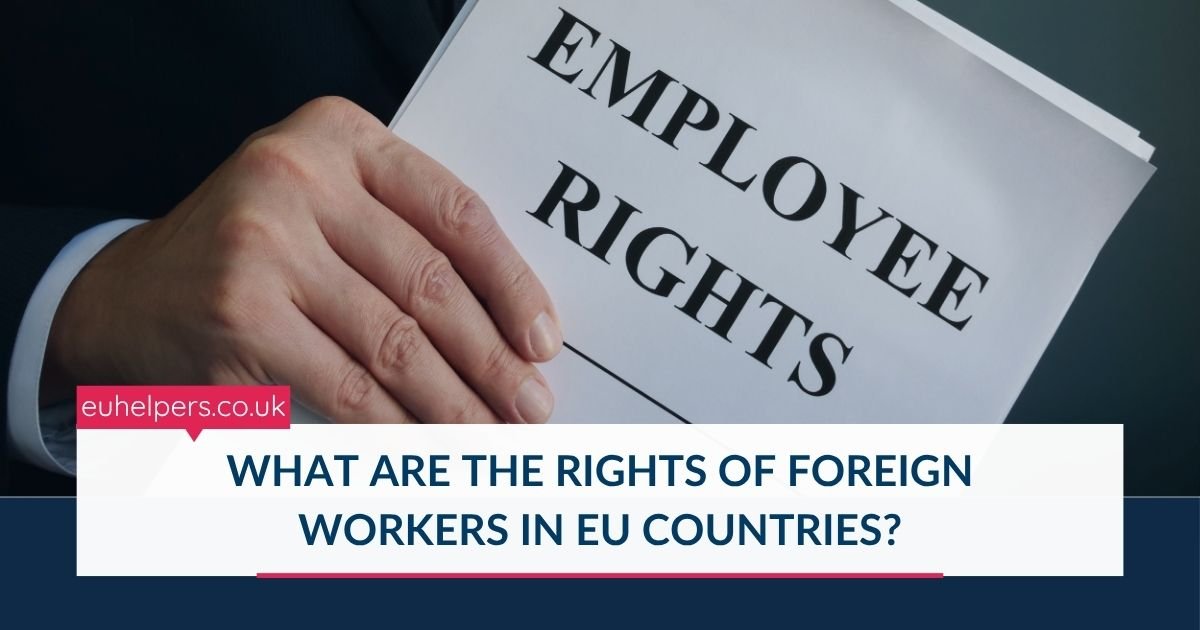
Europe remains one of the most attractive regions for foreign professionals seeking fair employment and stability. For non-EU citizens working legally in the European Union, it’s essential to understand your rights, protections, and benefits under EU and national labor laws.
This guide explains what rights foreign workers have in EU member states — from equal treatment and pay to social protection and safe working conditions.
1. Equal Treatment and Non-Discrimination
Foreign workers legally employed in EU countries are entitled to equal treatment with local citizens.
This includes:
-
Equal pay for the same work
-
Equal access to working conditions and social security
-
Equal rights to training, education, and housing assistance
Discrimination based on nationality, gender, race, religion, or age is prohibited under EU labor law. Employers must ensure fair hiring and workplace practices.
2. Right to a Written Employment Contract
Every worker in the EU, including foreigners, must receive a written employment contract outlining:
-
Job title and duties
-
Salary and payment schedule
-
Working hours and leave entitlements
-
Employment duration and termination rules
This contract serves as your main legal protection. Always read it carefully before signing and keep a copy for your records.
3. Fair Wages and Working Hours
EU employment standards ensure that all workers, regardless of origin, receive fair pay and humane working conditions.
-
Working hours: Typically limited to 48 hours per week, including overtime
-
Rest breaks: At least 11 hours of rest every 24 hours
-
Paid annual leave: Minimum of four weeks per year
Employers are required to pay on time, issue payslips, and comply with national minimum wage laws.
4. Safe and Healthy Work Environment
Foreign workers have the same rights to safe and healthy working conditions as EU nationals. Employers must:
-
Provide proper safety training and equipment
-
Conduct regular workplace risk assessments
-
Offer medical checks when required
-
Ensure insurance coverage for work-related accidents
If you believe your working environment is unsafe, you have the right to report it to labor authorities without retaliation.
5. Access to Social Security and Healthcare
Legally employed foreigners are entitled to social security and healthcare benefits similar to citizens, including:
-
Public healthcare access
-
Unemployment benefits
-
Pension contributions
-
Family and maternity benefits
Each country operates its own social system, but EU coordination ensures that benefits are portable if you move within the EU.
6. Freedom of Movement and Work (for Certain Categories)
EU citizens can freely work across member states. For non-EU citizens, rights depend on the visa or permit type.
Holders of an EU Blue Card or long-term residence permit enjoy greater freedom to move and work in other EU countries after a set period.
7. Protection from Exploitation and Illegal Employment
Foreign workers are legally protected from labor exploitation, underpayment, or forced work.
Employers found violating these laws face heavy fines or criminal penalties.
If you experience unpaid wages, excessive working hours, or confiscation of documents, you can contact:
-
Local labor inspectorate
-
Police or immigration authorities
-
Worker unions or nonprofit labor organizations
Your immigration status cannot be legally used against you for reporting abuse.
8. Right to Join Unions and Seek Legal Support
All workers in the EU, regardless of nationality, have the right to:
-
Join or form trade unions
-
Participate in collective bargaining
-
Access legal assistance in labor disputes
Unions provide free guidance and representation in employment-related cases.
9. Right to Residence and Family Reunification
After working legally in an EU country for several years, you may be eligible for:
-
Temporary residence extension
-
Long-term EU residence permit (after 5 years in most countries)
-
Family reunification, allowing your spouse and children to join you
These rights are protected by EU Directives 2003/109/EC and 2003/86/EC.
10. Access to Training and Career Development
Foreign workers can participate in vocational training, language courses, and professional development programs.
These opportunities help integrate into the local job market and improve career growth prospects within the EU.
Key Takeaways
-
Legal foreign workers in the EU have equal rights to pay, safety, and benefits
-
Employers must provide a written contract and respect labor standards
-
Workers have access to social protection, healthcare, and training
-
Reporting exploitation or unsafe work is a protected right
-
Long-term workers can apply for residency and family reunification
Sources
Disclaimer
This article is for informational purposes only. Labor rights and immigration laws differ by EU country and may change over time. Always check official national resources or seek legal advice before signing an employment contract.
FAQs
1. Do foreign workers have the same labor rights as EU citizens?
Yes. Legally employed non-EU citizens are entitled to equal pay, benefits, and workplace protections.
2. Are foreign workers covered by EU social security systems?
Yes, if they contribute through legal employment, they can access healthcare, pensions, and unemployment benefits.
3. What should I do if my employer refuses to pay wages?
File a complaint with the labor inspectorate or seek union/legal assistance. Authorities can enforce wage recovery.
4. Can I join a labor union as a non-EU worker?
Yes. All workers have the right to union membership and collective representation.
5. Can I stay in the EU after my contract ends?
You may apply for a new job or residence permit renewal, depending on national immigration rules.
